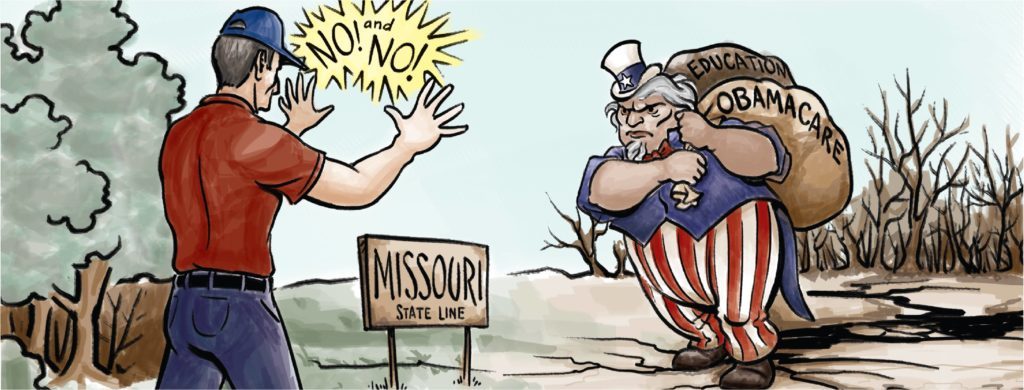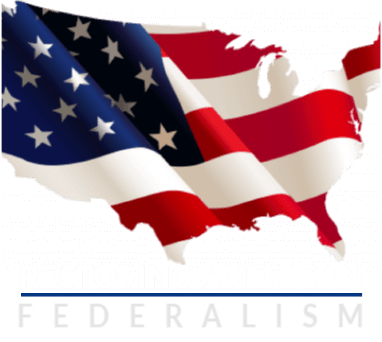The Separation
Is it right for small-government people to believe in public education? Can a person say they are small-government and still hold to a philosophy that the education of our youth is, in fact, in the best interest of social order, liberty, and civil society? Is it likely that a person can be 100% on board for limited government and also 100% on board with the idea that an education for future citizens is not only an entitlement, but a necessity? To all these questions, the only reasonable answer is a resounding, “Yes!”
So, what’s the problem with American education? It is clearly not working. We are consistently paying more and more money for less and less product. The answer is as clearly obvious: public schools!
Let’s use a couple of perfect and timely analogies to understand the difference between “public education” and “public schools”. For better or worse (I am not here to argue that right now), in this country we have “public food”. Food stamps, WIC, SNAP, whatever the name, it is “public food”. Can you imagine, whatever your take on “public food”, how disastrous and expensive this program would be if the government owned the grocery stores? Not only owned the stores, but owned the entire process for delivering the food – the warehouse, the real estate, the truck that delivers the groceries. What if the grocer, the producer, the stocker, the cashier – everyone who is in the chain between the farmer and consumer — was on the government’s payroll? Would that be a good thing? I think everyone this side of a Bernie Sanders communist would say, “NO!”
What if, instead of Medicaid, Medicare, and Obamacare, and other forms of “public medicine”, the government owned all the hospitals? What if the government owned the real estate, the x-ray machine, the medicine, the scalpels, the syringes, the band-aids. What if all of the doctors, nurses, food service, housekeeping, and surgeons were on the government’s payroll? What if government decided who got treated and for what – and what the specific authorized treatment for any specific illness was to be? What if government decided that all doctors who have been doctors for x number of years got paid exactly the same as all other doctors with the same number of years of “service” whether they were good doctors or bad doctors? How inefficient and expensive would that be?
So, instead of government owned food, you walk into a privately-owned grocery store chock-full of privately-owned groceries stocked by privately-paid store employees who are compensated specifically for serving you. You choose from over 150 kinds of breakfast cereal; 100 shapes, brands, sizes, and aromas of coffee; 68 different jars of peanut butter, and 300 brands, sizes, flavors, colors, and textures of potato chips. All because? Private providers of goods and services are competing for your $3.79.
As much as the idea of the government owning the entire grocery delivery process makes even a liberal shudder, complete government ownership from beginning to end is exactly how we treat public education in this country. Students and parents have one choice of school, one choice of teacher, one choice of curriculum – all owned 100% by the same government. It’s very inefficient and overly expensive – increasingly so! This school year, DESE calculates that Missourians pay $10,724.08 per pupil for public schools. This amount does not include service of debt (bonds), payment of outstanding debt, capital investment, or future-year commitments like contracts to curriculum providers. All told, Missouri is on the hook in the 2017-2018 school-year for about $14,000 per pupil. Of that money, about 60% comes from local resources, nearly 30% from the State, and around 10% from the federal government. Yet the critical control of that education is inversely proportional to the actual spending – with the individual parent of the individual student dead last in any individual decision or choice. You can follow the link above to see the numbers for your own school district and compare it to the Missouri average.
Yes, there is certainly room in a small-government platform for public education. There is increasingly less room for public schools. It is time, don’t you think, for a complete separation of school and State!
The Divorce
Now that we have successfully separated the need for a “public education” from the appearance of need for a “public school”, are you still with us?
If not, let’s investigate the reason. It’s either because you do NOT believe at all in public education, or it’s because you DO believe entirely in public school. If you are not with us because you do not believe in public education, then we have nothing to offer you. You believe that education, in general, should be a commodity available only to you and to those with at least as much money as you. You care about your child’s education, but much less about the education of the general population and, to you, the future of this Republic just isn’t worth any of your investment.
If you are not with us because you believe in public schools, then we have nothing to offer you. You believe that government should control education from top to bottom. You believe in controlling the education of your child, but you believe far more in also controlling the education of your neighbor’s child.
If you are still with us, then we have something to offer you. Because, liberal or conservative, left or right, rich or poor, Christian or not, there is little in your life as important to you as the education of your child – and you see little or no hope for the public school. Your liberal and conservative politicians argue incessantly about how to make your public school better. They call for more money, more choices within the current government-managed system, more security, more technology, more “standards”, more, more, more – and all you see is less, less, less (except the money part). But always, with every call for “more”, they also call for more and more control. And, while the plutocrats in power this year talk about making your public schools better, nobody is talking about making public EDUCATION better! The answer is “education” – it clearly isn’t “schools”.
I think we have a plan that can deliver public education. It’s not a new idea. It’s not going to sound popular at first glance. But, as you ponder this issue, as you view the issue of separation of school and State from all the angles, as you become more and more able to differentiate “public education” from “public schools”, we think you will like it.
If you can, for a moment, dismiss from your mind the idea of controlling EVERY child’s education and embrace the importance of controlling only YOUR child’s education, rid yourself of the desire to make your neighbor’s choices and examine the simple notion of making your OWN choices – without strings, without mandates, without repercussions – we think you will love it. The plan is simple, straightforward, and solution-oriented. Here. Take this $10,000 per child and go buy your kid an education. Our public responsibility to your child’s education is over. You choose.
Child Support
Now we have completely divorced the idea of “public education” from the idea of “public schools.” We are talking about an education that is provided to your child completely by the free market. Don’t let the term “free market” scare you off. Just like potato chips and breakfast cereal, the free market stands today as the best, most efficient, and most innovative method for delivering any product to the masses. And, you need to start looking at your child’s education as just that — a product. A product you buy (because even now you pay), a product for which you frugally shop, and now a product you also choose — 100% — for yourself and your child.
But how do we get to this free market? Clearly, it is out of the question to simply decree on day one, “Missouri’s public schools are closed. Go find yourself a new school.” The infrastructure existing in today’s marketplace is certainly ill-equipped to handle the immediate influx of 884,000 new students. We must get there with a plan, and that plan must entail consideration for the students who will be affected. To borrow a phrase from a failed public-school program: no child can be left behind.
So, how do we devise a plan that totally eliminates government-owned schools, maintains a robust system of education, and leaves no child behind?
Let’s discuss, first, the prerequisites of that plan.
First and foremost, it must be up-front! There should be no attempts to hide the end game of dissolution of State schools. There should be no trickery in the methodology or politics of this. We state the goal up-front, and we detail how we get there. This is important for the families involved, for the tax-paying public, and for the investors who come to Missouri’s new education market.
Secondly, it must be fair! I picked a number ($10,000) based on the average price today of a private education in Missouri. Market factors will change that number. We all know that a huge influx of competition should bring that number down a bit. We also know that, in any market, the price will be determined somewhat by how much money is out there doing the shopping. “Charge what the market will bear” is a fair and understandable pricing mechanism in the free market. The balance of “charge what the market will bear” and the intense competition for your education dollars will dictate the final number. But, in the end, rich and poor alike must have access to a well-rounded education for their K-12 children.
Finally, and as importantly, it must be desirable. Perhaps the idea of a free-market for education hasn’t occurred to most parents. Most parents have said to themselves, “I wish I could take my kid out of THAT school and put him/her in the school I choose. I just can’t afford it.” Many have said, “I wish I could choose to home-school. I just can’t afford it.” I think MOST have merely not expanded their thinking to the idea that we CAN completely separate the government from their school. There isn’t a person alive today who knows a public-school system in which the government was not over-involved.
One of the up-sides of this free-market plan is that a significant restructuring of education in Missouri is going to require an amendment to the State Constitution. The people themselves will actually vote on this plan. It can’t be forced on you by some Senator. It cannot be mandated by the legislature or by some department of the executive branch. And it cannot be forced on you by some court. You are the one who makes the choice!
Now that we’ve seen the prerequisites, let’s discuss the implementation of an actual plan to completely separate school and State.
I propose a three-year phase-in. At the beginning of year one, every parent will be given a grant to attend any public school of their choice. That grant will be redeemable for a full school year of education at any Missouri public school.
At the beginning of year two, every parent will be provided a grant for up to $10,000 that can be presented to any school they choose. That school might be public, private, home-school, cooperative. DESE will be scaled back proportionately to serve the number of people who still choose to participate in the rapidly-dwindling Missouri public school system.
At the beginning of year three and every following year, every parent will be given a “no-strings attached” check to apply toward their child’s education, DESE will close, and the State of Missouri will be out of the school business. We will still be invested in the public education in which we all believe, and the new and improved free-market schools which deliver that education will be totally and completely separated from the State of Missouri.
So, how about you? Would you actually cast a vote to give yourself a 100% choice in how, when, and where your child is educated? And would you vote to relinquish, 100%, any control over how, when, and where your neighbor’s child is educated? It is about control! Totally! Let’s face it: in reality, the amount of control you now have is “none”. In this proposed free-market plan for education, we offer you “all”.
Amicable Joint Custody
Now, we have identified the problems associated with complete government control, we’ve proposed a complete solution, and we’ve decided how to get there. Here is an open call to all — regardless of personal political ideology, regardless of personal values, regardless of your own deeply personal definition of education — to take a very “outside the box” look at exactly what “school choice” actually means.
Our personal vision of “school” has been firmly set within the government-owned and government-controlled paradigm. Not a single person alive today has ever known any public education without government ownership of the entire process by which that education is delivered. But it is a difficult task to step back and evaluate our own desires for our children and for the future of our Republic while at the same time harnessing our own internal drive for control. It is imperative to come to some understanding that the desires we have to control our own family’s destiny are exactly the same desires our fellow citizens have for their families.The root question you must dive deeply into yourself to answer is, “To what extent am I willing to cede my desire to control my neighbor’s choices?” For, that is exactly what public “school” is all about, isn’t it?
I firmly believe that my child is safest during these dangerous times if the teacher in his classroom has a gun ready to immediately protect my child from the shooter. You, on the other hand, are terrified by the thought of a loaded weapon in your child’s classroom. I understand you. Do you understand me? Which one of us will win in the battle to force the other to have it our way? Why is that even a question? Why can’t we both choose to have our child protected in the best way we see fit?
I do not want to send my child to a school where boys and girls share a bathroom at the same time. Another believes firmly that this is a perfectly acceptable social behavior. Which one of us will force our will on the other?
I want my child to learn some Biblical truths. You may not even choose to recognize any Biblical truths. And, while we both agree that the State should NEVER write prayers for students to recite, why can’t we both choose to make our values part of our child’s education?
This need we have as humans to control the children of others, while at the same time coveting an extreme level of control over our own children, is a tendency that would do us, our nation, and our future very well to overcome. And overcoming that tendency is the only path to achieving true choice in how your child is educated. I have little doubt that the liberal wants the very best for their child. I have as little doubt that the conservative wants exactly the same thing. If you agree, how willing are you to leave behind the fear that “There might be a school for Muslims” or that “There might be a school that teaches God”? How willing are you to allow your neighbor to send their child to a school that allows, even encourages, the teacher to be well-prepared to defend your child’s life? Provided, of course, that your neighbor is willing to allow you to send your child to a school with a strict “no-gun zone” policy? How deep is your need to force your will on your neighbor? Is it deeper and more firmly set than your desire to make your own choices for yourself?
That, in a nutshell, is what we are asking you to address. For every liberal, every conservative, every Christian, every atheist, every gun lover, every gun hater, and every parent knows that the government cannot feasibly satisfy all those perceived needs. We know that a government-owned, start-to-finish food delivery system could not and would not offer over 150 kinds of breakfast cereal; 100 shapes, brands, sizes, and aromas of coffee; 68 different jars of peanut butter; and 300 brands, sizes, flavors, colors, and textures of potato chips. But we know those choices exist. And we want them!
I simply ask you to consider whether your deeply-rooted desire for what is best for your child when it comes to education as you define it for yourself as well as your need to control that for you and your family extends as far as allowing the same for me and my child. If so, here is a way to get there.
This is true school choice.
Comment or email federalist1@restoringamericanfederalism.com and let’s all discuss this.
American Federalism, a definition.
“The powers delegated by the proposed Constitution to the federal government are few and defined. Those which are to remain in the State governments are numerous and indefinite. The former will be exercised principally on external objects, as war, peace, negotiation, and foreign commerce; with which last the power of taxation will, for the most part, be connected. The powers reserved to the several States will extend to all the objects which, in the ordinary course of affairs, concern the lives, liberties, and properties of the people, and the internal order, improvement, and prosperity of the State.” (Emphasis added) James Madison, Federalist 45




The Public School system has failed with Covid19 like it also failed with active shooters and as it has failed with test scores. The model is antiquated treating students as widgets in an industrial age that is no longer exists. Dumbing students down with group think and political correctness divorced from civics, history and economics further proves its failure. The solution is to let the money follow the student as in PELL grants and the GI BILL. Now is the time to act while Teachers and their Union don’t want to teach. We must push Rand Paul’s school choice now. https://bit.ly/2PB45e7 .
Sounds like a GOOD plan!!!